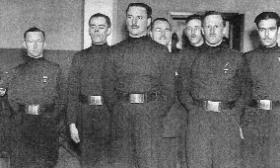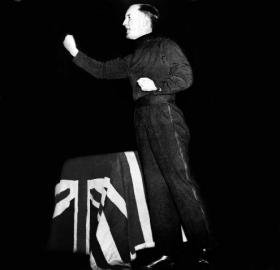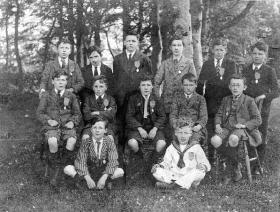Lord Haw-Haw online
Published in 20th-century / Contemporary History, Features, Issue 2 (March/April 2010), The Emergency, Volume 18
Above: William Joyce (left)—a.k.a. ‘Lord Haw-Haw’—with Oswald Mosley (centre) in the Blackshirt uniform of the British Union of Fascists and (below) delivering a fiery speech. (The Friends of Oswald Mosley)
WhenI was working on a biography of William Joyce, Lord Haw-Haw, there wasno difficulty in procuring the few remaining examples of his broadcastvoice. They had been compiled onto CD and circulated among a certainsub-culture that remains fascinated by Joyce, the last man to be hangedby the Crown for treason in 1946. And this CD was sent to me by severalhelpful sources. I would not describe this sub-culture as fascist or inany way sinister, but there remains an enduring interest in anythingconnected with the Third Reich, and the Galway-reared William Joyce iscertainly part of that constellation.
Now the BBC has put thesefew examples of Joyce’s broadcasts into the public realm—online—andthey are certainly worth hearing. But in terms of the body of hisbroadcast work—which was continuous, from late 1939 until April of1945, during which period he broadcast sometimes several times aday—they remain a fairly thin representation of Joyce’s output. All butone are from 1940, and they are mere snippets: his tone isunmistakable, but the clips are so short that they are somewhatinsubstantial.
 The one broadcast that has real historicalweight—if one can put it that way—is the ten-minute ‘farewell’broadcast made on 30 April 1945. It is entirely clear that Joyce isvery drunk indeed in this valediction, and for that reason alone it isa useful linguistic study of how the voice is altered and elements ofsound are amplified by intoxication.
The one broadcast that has real historicalweight—if one can put it that way—is the ten-minute ‘farewell’broadcast made on 30 April 1945. It is entirely clear that Joyce isvery drunk indeed in this valediction, and for that reason alone it isa useful linguistic study of how the voice is altered and elements ofsound are amplified by intoxication.
Joyce ‘constructed’ his ownaccent—he had lived in Ireland from the age of three until he wasnearly sixteen (he had to leave the country hurriedly because the IRAwere planning to shoot him on a charge of snitching to the Black andTans) and in the following years schooled himself in London. He
was,as it happens, a brilliant linguistic scholar and an expert in earlyAnglo-Saxon and Old Norse, so he knew about voice and language. He cameto speak like an educated Englishman who had been born a foreigner (hehad been born in America, a naturalised American of Irish andEnglish-born parents, so the description is not too wide of the mark).

A Confirmation photo of William Joyce (back row, third from right) taken at St Ignatius College, Galway, in 1915 or 1916. In his last, inebriated broadcast, Joyce’s accent recaptured some of its Galway roots.
Butin this last, very inebriated speech, Joyce’s accent recaptures some ofits Galway roots. ‘The whole of my WORK has been in vain,’ he suggests,using the rounded Irish ‘r’. ‘No MEASURES . . . will shatter Germany,’he goes on, and again you can hear that Irish intonation recurring.‘Germany will LIVE because the GERMAN people have in them the secret oflife.’ It really is an illumination of what radio does so expertly:expose unmistakably the timbre of the voice, and of course revealinstantly any trace of alcohol or other opiate.
Joyce knew thegame was up when he made this broadcast: he and the other broadcastershad raided the cellars of the Hamburg Reichsrundfunk, drinkingeverything in sight. What he did not know at the time was that Hitlerhad committed suicide on that very day.
Although Joyce broadcastprodigiously (and wrote many radio scripts for other broadcasters too),the tapes for most of his broadcasts were not preserved. Firstly, theRundfunk—the German broadcasting authority—in those days wiped thediscs clean for reuse (as did, for that matter, Radio Éireann, as itthen was—we have very few recordings of W. B. Yeats speaking becausethe records were wiped). So, unless there are some recordings lurkingin the Russian archives (the Soviets quickly took over the Berlinbranch of the Rundfunk), this, online now, is all there is. Of course,the BBC monitored most of the broadcasts and transcribed them towritten records at the time, which are available at the Imperial WarMuseum, London—although, again, these transcripts tended to ignore orperhaps discard some of the more facetious, even comical, remarks thatJoyce could throw into a broadcast. Many older people I interviewedremembered him as being funny.
There was also a strongrumour-factory surrounding the Haw-Haw broadcasts. People ‘remembered’him making statements for which there is no concrete evidence, such asa public clock in a certain town being broken; and he did terrify (orsometimes warn) his British listeners that the Luftwaffe would strikeat a certain time. His reputation became almost occult, and an elementof this remains. I am still told that William Joyce had a secret radioset in various English coastal towns before the war—Folkestone beingone such—but real evidence is hard to come by.
WithJoyce, there is always an element of legend as well as of history. Whatis certain is that his bodily remains lie at peace in BohermoreCemetery in Galway City, and his daughter Heather, now an elderly lady,travels there every two years to clean and tend to the grave. HI
MaryKenny’s Germany calling: a personal biography of William Joyce, LordHaw-Haw, first published in 2003, was reissued by Max Press, London, in2008.
















